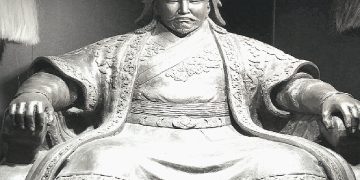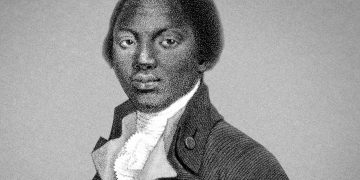The Indo-Greek kingdom was a Hellenistic kingdom that included, at different times, various regions of the northwestern Indian subcontinent. The time of existence is the last two centuries BC.
In fact, the Indo-Greek kingdom was a continuation of the Greco-Bactrian kingdom (although they coexisted for some time), destroyed by the Yuezhi nomads.
It is assumed that the conquest of the Indian territories began as early as Demetrius I in 187/185 BC. after the Mauryan dynasty was overthrown by the commander Pusyamita Shunga, who founded his Shunga dynasty (185-78 BC). Initially, Gandhara was captured. Subsequently, already during the reign of Menander (155 / 165-130 BC), the Greeks were able to advance to the very capital of Pataliputra in East India. But the first stage of the seizure of land was completed by 175 BC. e. and the kingdom of Shunga pushed to the east.
In 170/166 BC. in Bactria, Eucratides I came to power, overthrowing the Evtimed dynasty. And he begins a campaign in the Indian lands in order to finally eradicate the overthrown dynasty. There he finds Apollodotus I, from whom he takes part in the territory.
Apollodorus I himself can be considered the founder of the Indo-Greek state, located south of the Hindu Kush, ruled by representatives of the dynasty descended from the Greco-Bactrian kings (there is an assumption that Apollodotus was the brother of Demetrius I). Apollodorus I owned the lands south of the Hindu Kush. From the Euthydemid dynasty, he owned the Paropamisads and the northern part of Arachosia. Subsequently, he expanded his kingdom, subjugating some areas in the Indus basin south of Gandhara.
The second ruler of this state was Antimachus II the Victorious (Nicephorus), after which about 155 BC. began to rule Menander, the most famous Indo-Greek king, based on our sources.
Menander ruled during the life of Eucratides I, who did not abandon his attempts to subdue the Indo-Greek rulers. At the beginning of his reign, Menander had to learn the bitterness of defeat. Around 150, Eucratides occupied the Paropamisads. However, when returning from an Indian campaign around 145 BC. e. Eucratides was killed by his own son.
As for Menander, whose name is associated with the real flourishing of the Indo-Greek state, he, unlike most other Indo-Greek kings, was well known in the ancient written tradition. So, in the messages of ancient sources, he appears as a powerful and just monarch, whose memory continued to live in subsequent generations. King Milinda (Menander) in the Indian philosophical essay Milindapanha (Questions of Milinda) is shown as a wise and attentive companion of the Buddhist monk Nagasena, the oldest parts of which were compiled in northwestern India around the turn of the era. By the way, this work tells about the birthplace of Menander, the city of Calisigrame near Alasanda (Alexandria), located in the area between two rivers. Most likely, this city was Kadrusi, founded, according to the data of ancient tradition, by Alexander himself in Paropamisads, one day’s journey from the Caucasus Alexandria. Since the Greco-Bactrian expansion into Indian territories began around 187 BC, by the time of his accession (around 155 BC) Menander was approximately 30 years old.
At the beginning of his reign, Menander tried to move deeper into India. He made a trip far into the Ganges valley and reached, as mentioned earlier, Pataliputra (Patna), the capital of the kings of the Shung dynasty. However, he had to turn back, as he learned of the invasion of Eucratides into his domain. Probably on the way back, somewhere on the banks of the Sindhu River (Kali Sindhu), Menander’s cavalry was defeated in a battle with the army of Vasumitra, the grandson of the Shung king Pushyamitra. Such a failure should have seriously weakened the combat capability of the Indo-Greek army on the eve of its clash with the troops of Eucratides.
Forced to leave Eucratida Paropamisada, Menander moved his capital from Alexandria of the Caucasus (Begram), which was in the hands of the enemy, to Sagala (Sakalu, modern. Sialkot) in Punjab, named by the Greeks Euthydemia in honor of Euthydemus I, the founder of the dynasty to which he belonged.
However, immediately after the death of Eucratides in 145 BC. e. Menander recaptured Paropamisada from his successors and returned to the former capital with his court. He even managed to oust the Greco-Bactrian ruler Heliocles from the western regions of Gandhara, thus becoming the most powerful of the Greek kings of India. The center of his vast state was Gandhara, Paropamisads and, probably, the northern and eastern regions of Arachosia. The eastern border of Menander’s domain was on the Ravi River in the Punjab. In the north, Menander owned the Swat Valley, and in the south, the Indus Delta, the Kathiyavar Peninsula and part of the Arabian Sea coast between the Hub and Khingol rivers. Menander died around 130 BC. during a campaign directed, as it is sometimes assumed, against the nomads who attacked Bactria.
After the death of Menander, his widow Agathoclea began to rule, with her young son Straton I. At the same time, the Yuezhi tribes invaded Bactria. The pseudo-Bactrian king Heliocles (son of Eucratides I), according to one version, dies, according to the other, runs through the mountains to the Hindu Kush and reclaims part of the land from the heirs of Menander. The division of the Indo-Greek kingdom into two parts – eastern and western – dates back to the same time. The eastern was owned by the heirs of Menander and stretched east from the Jelum River, and up to Mathura. The western one included Arachosia and Paropamisads, western Punjab.
During the 1st century BC. Indo-Greeks gradually lost territory. The eastern regions were attacked by the Indians, while the western regions were attacked by the Scythians, Yuezhi and Parthians. After Menander, about 20 Indo-Greek kings are known (a list of kings and coins of Indo-Greek kings), but in view of the fact that there are no clear written sources, it is very difficult to establish both the time of the reign of these kings and the territories under their control.
The eastern territories of the Indo-Greeks begin to lose around 100 BC, as evidenced by the coins of Indian rulers found in the Mathura region. Then the western king Philoxenus was able to briefly restore the territory of the Indo-Greek kingdom from Paropamisad to western Punjab, but then this kingdom fell apart.
Around 80 BC King of the Indo-Scythians Meus, and possibly a military leader in the service of the Indo-Greeks, ruled northwestern India (Gandhara and Taxila) for several years, but then the Indo-Greeks were able to regain power again (Apollodotus II came to power). The next king Hippostratus (65-55 BC) was perhaps the most successful of the subsequent kings, but then he was defeated, and the Indo-Scythian king Azes I established a new dynasty.
The last of the western Indo-Greeks was Hermes, who ruled until about 70 BC. e., until it was replaced by the Yuezhi who came from Bactria. In the Chinese chronicles of the Late Han Dynasty, it is said that the Chinese general Wen Zhong helped organize the alliance of Germei with the Yuezhi against the Indo-Scythians. After 70 BC. e. The Yuezhi began to rule the Paropamisads, but for another thirty years they issued Hermey coins, and then they were replaced by Kushan coins.
Throughout the 1st century BC. e. The Indo-Greeks gradually lost territory due to the invasion of the Indo-Scythians, holding out in eastern Punjab until the last Indo-Greek king Straton II was defeated by the Indo-Scythians, and in 10 AD. e. Rajuvula came to power.












